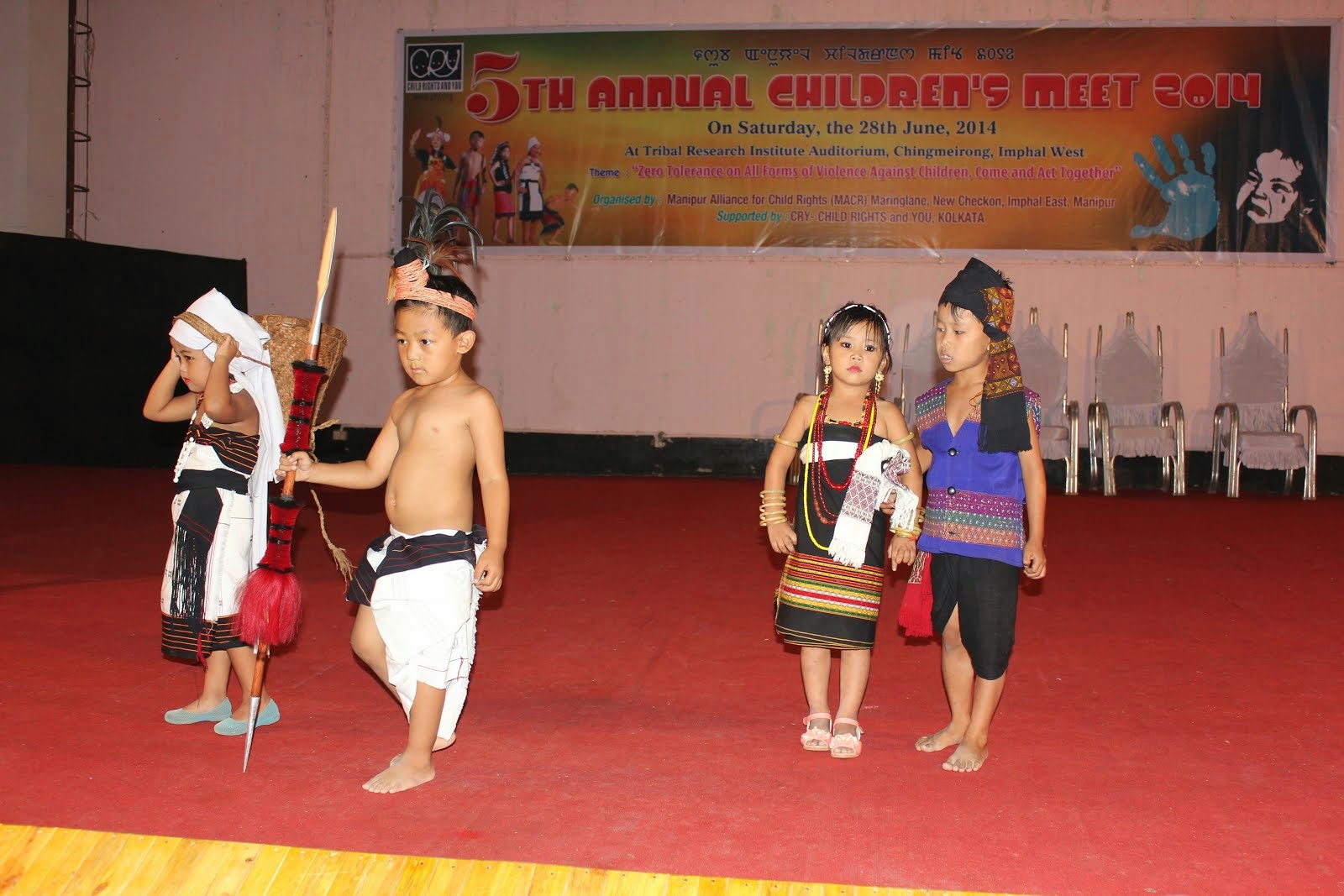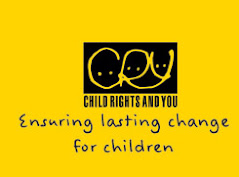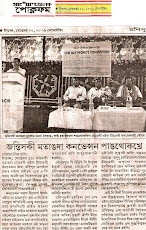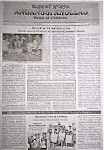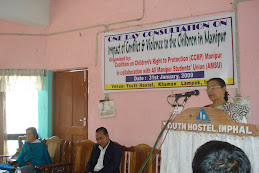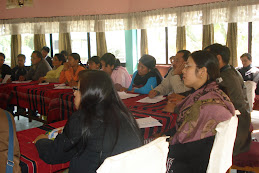Imphal Free
By Keisam Pradipkumar
Being dismayed by the acute shortage of institutional services and medical treatment facilities, Children Living with HIV/AIDS, rape victims, orphans, children of broken family and psychologically traumatized children in Ukhrul district are still living in a pitiable condition, despite the state has launched the mega child welfare scheme such as “Integrated Child Protection Scheme” (ICPS), subsequent upon the enactment of Juvenile Justice (Care and Protection of Children)2000 Act amended in 2006. Besides, children in this district still pay fees for sports meet, while parents bear honorarium for privately engaged teachers by sacrificing their wages of MGNREGA. Adding to the large scale subletting of government/ ADC appointed teachers, the issue of MGNREA supported teachers in hill districts has become another sarcastic paradigm to the much talked about “ The Right of Children to Free and Compulsory Education Act, 2009” in Manipur. The question is where has the state government utilized those numerous teachers recently appointed under SSA and RAMSA projects?
In recent times, a minor girl from Ukhrul was raped on 24th June, while another girl was murdered after having rape on 10th September respectively this year. Since there was no shelter home in Ukhrul, the rape victim of 24th June incident, baby Angamla (name changed) 11 years old, belonging to an abject poverty stricken family, is presently taking shelter in one of her relatives place. She was first kept in a girls’ shelter home in Imphal. Her case was taken up by Manipur State Commission for Women, though the poor victim hasn’t got any compensation till date. The girl deserves institutional care considering her mental status and deprived socio-economic.
Such victim like baby Angamla from Ukhrul, are usually referred to a girls shelter home in Imphal by the Child Welfare Committee, Ukhrul. Minor girls from Tangkhul community felt quite unsuitable in Imphal as they were yet to conversant with Manipuri language. The diverse social and cultural background posed as the huge barriers making interpersonal counseling and formal education to the victim children a hard hitting job to the service providers.
Another, Tangkhul girl baby Khangamla 13 years from Ukhrul, ran two times from an Imphal based girls shelter home “ Punya Nawa Yaiphakol”. For the last 3 years , she ran away more than 5 times from different places. Her drunkard father and poor mother failed to look after her, and even they are reluctant to take her back. The disobliging ambiance in her family became rather detrimental to her psychological well being, which made her now virtually a psychologically distressed child needing immediate medical treatment and institutional care.
It is worth to mention that, dubious human trafficking net in India is targeting the north east women for sex trade, spa massage service and of late for forced marriage as common wife. Ukhrul, having the highest rate of migration of young girls to other states in search of lucrative jobs, there are several trafficked survivors in the district. However, restoration and rehabilitative process for the trafficked survivors is almost nil. The district does not have either a women shelter home or girls children home, whereas ever getting bigger number of victims are intolerantly searching the compassionate helping hand of such temporary institutional care from pillar to post.
Child Welfare Committee, Ukhrul’s Chairperson Gajendra Prasad Mohanty said, “We are totally helpless here, as such facilities are not in Ukhrul at all, many children, such as baby Khangamla remained untreated. Opening of girls shelter home, providing counseling and rehabilitative support for such marginalized girls and children are the desperate needs of Ukhrul district ”.
The status of the Juveniles in conflict with law (JCL) is quite disheartening , as such children who are allegedly committed offences, are not getting appropriate treatment supposed to be given under the vindicated juvenile criminal justice system.
People hardly know who are the appointed social worker members and Principal Magistrate of the board and where is its office, though the concerned department has already set up the statutory body years back. As a result, many delinquent children’s cases ended up only in the hands of un child-friendly police and mob trials, before reaching to the juvenile justice procedures. The dignified role of Special Juvenile Police Unit (SJPU) is yet to be seen. Overriding the legal procedures, recently a rape victim child from Ukhrul was kept in a private hotel in Imphal by Ukhrul police in lieu of admitting her to the hospital, thereby delaying the medical treatment and foreignsic test process.
The plight of Children Living with HIV/AIDS in the district is really pathetic, when it came to learn that they are taking unmeasured random ART doses, since the CD4 machine in Ukhrul remained non-operational since January this year, even though the district is one of the highest HIV prevalent districts in Manipur ranking at “A” category. There are around 85 boys 94 girls ( Pre ART) while 32 girls and 32 boys are On ART, out of cumulative Pre ART 1099 and On ART 682 of the district. The Ukhrul town is having around 20,000 children population out of 50,000 total population.
Mr. C. Leisan, member, Ukhrul District NGO Alliance for Health (UTNAH) said “Most regrettably Ukhrul district hasn’t got its own Community Care Centre till now, though NACO had reportedly sanctioned it in 2007 ”. He said “ No program from Legislative Forum on HIV/AIDS is ever held in Ukhrul. There is no blood bank, though in 2000 MACS reported that it was already sanctioned. Since CD4 machine lying defunct lots of people are referred either to RIMS or JNIMS expending lot of money and resources”.
Mrs Chonjon and Mamlaphi (name changed) both PLHAs shared that stigma and discrimination is still highly persistent in the community. PLHA widows remained almost aloof and could not even form SHGs. They were yearning for certain economic support to feed their ailing children and themselves.
The recent public hearing of NCPCR held at Kangla, Imphal in August, 2011, loudly exposed the proxy teacher or sub letting of teachers in hill districts of Manipur with special reference to Chandel and Ukhrul. More cases of proxy teachers are found in ADC run schools. Lacking of Hindi, Manipuri, Math, Science teachers and poor infrastructures including absence of separate toilets for girls being the common scenario visible at all the schools in hill districts. Till now, many AIDS inflicted orphans are not getting free education under RTE in recognized private schools.
Head master of Shirui Jr High School admitted that Glory day’s expenses is being born by students reading in elementary classes. A student has to contribute Rs.150 every year for such observation comprising of sports and cultural events. School authority, meticulously did not issue receipts for such money paid by the students. They termed it as “ contribution” not “fee”, thereby trying to run off from the purview of RTE strictures. According to the RTE Act free education means no financial constraints can “prevent” a child from enrolling, attending and completing elementary education. Hence, if glory day is a part of extra curricular activities it should be organized with state’s expenses, and students and their parents must not be liable to pay for it.
The ZEO, Ukhrul Mr Adverest Luikham, who is looking after 137 schools in the district said “All the fees charged have been refunded as per NCPCR directive, and Glory day is like a community supported event which we cannot stop. Since there is no provision to bear the expense we are helpless but organizing it with contributions of the parents”.
Contrary to RTE’s high sounding provisions, Ms Shila J Konghay, president Tangkhul Shanaolong a popular civil body said “Recently I visited certain villages such as Chalong Chingthak, Chalong Phalang of Kamjong sub-division, some 90 Km away from Ukhrul town, where not a single school has been established till today. You could find neither children nor school in these villages, as all the children left their native villages either for Ukhrul town or Imphal for study”.
I am still pondering, how long the true accessibility to RTE Act and welfare schemes for children will remain as a far cry from the towering blue hills of Ukhrul.
By Keisam Pradipkumar
Being dismayed by the acute shortage of institutional services and medical treatment facilities, Children Living with HIV/AIDS, rape victims, orphans, children of broken family and psychologically traumatized children in Ukhrul district are still living in a pitiable condition, despite the state has launched the mega child welfare scheme such as “Integrated Child Protection Scheme” (ICPS), subsequent upon the enactment of Juvenile Justice (Care and Protection of Children)2000 Act amended in 2006. Besides, children in this district still pay fees for sports meet, while parents bear honorarium for privately engaged teachers by sacrificing their wages of MGNREGA. Adding to the large scale subletting of government/ ADC appointed teachers, the issue of MGNREA supported teachers in hill districts has become another sarcastic paradigm to the much talked about “ The Right of Children to Free and Compulsory Education Act, 2009” in Manipur. The question is where has the state government utilized those numerous teachers recently appointed under SSA and RAMSA projects?
In recent times, a minor girl from Ukhrul was raped on 24th June, while another girl was murdered after having rape on 10th September respectively this year. Since there was no shelter home in Ukhrul, the rape victim of 24th June incident, baby Angamla (name changed) 11 years old, belonging to an abject poverty stricken family, is presently taking shelter in one of her relatives place. She was first kept in a girls’ shelter home in Imphal. Her case was taken up by Manipur State Commission for Women, though the poor victim hasn’t got any compensation till date. The girl deserves institutional care considering her mental status and deprived socio-economic.
Such victim like baby Angamla from Ukhrul, are usually referred to a girls shelter home in Imphal by the Child Welfare Committee, Ukhrul. Minor girls from Tangkhul community felt quite unsuitable in Imphal as they were yet to conversant with Manipuri language. The diverse social and cultural background posed as the huge barriers making interpersonal counseling and formal education to the victim children a hard hitting job to the service providers.
Another, Tangkhul girl baby Khangamla 13 years from Ukhrul, ran two times from an Imphal based girls shelter home “ Punya Nawa Yaiphakol”. For the last 3 years , she ran away more than 5 times from different places. Her drunkard father and poor mother failed to look after her, and even they are reluctant to take her back. The disobliging ambiance in her family became rather detrimental to her psychological well being, which made her now virtually a psychologically distressed child needing immediate medical treatment and institutional care.
It is worth to mention that, dubious human trafficking net in India is targeting the north east women for sex trade, spa massage service and of late for forced marriage as common wife. Ukhrul, having the highest rate of migration of young girls to other states in search of lucrative jobs, there are several trafficked survivors in the district. However, restoration and rehabilitative process for the trafficked survivors is almost nil. The district does not have either a women shelter home or girls children home, whereas ever getting bigger number of victims are intolerantly searching the compassionate helping hand of such temporary institutional care from pillar to post.
Child Welfare Committee, Ukhrul’s Chairperson Gajendra Prasad Mohanty said, “We are totally helpless here, as such facilities are not in Ukhrul at all, many children, such as baby Khangamla remained untreated. Opening of girls shelter home, providing counseling and rehabilitative support for such marginalized girls and children are the desperate needs of Ukhrul district ”.
The status of the Juveniles in conflict with law (JCL) is quite disheartening , as such children who are allegedly committed offences, are not getting appropriate treatment supposed to be given under the vindicated juvenile criminal justice system.
People hardly know who are the appointed social worker members and Principal Magistrate of the board and where is its office, though the concerned department has already set up the statutory body years back. As a result, many delinquent children’s cases ended up only in the hands of un child-friendly police and mob trials, before reaching to the juvenile justice procedures. The dignified role of Special Juvenile Police Unit (SJPU) is yet to be seen. Overriding the legal procedures, recently a rape victim child from Ukhrul was kept in a private hotel in Imphal by Ukhrul police in lieu of admitting her to the hospital, thereby delaying the medical treatment and foreignsic test process.
The plight of Children Living with HIV/AIDS in the district is really pathetic, when it came to learn that they are taking unmeasured random ART doses, since the CD4 machine in Ukhrul remained non-operational since January this year, even though the district is one of the highest HIV prevalent districts in Manipur ranking at “A” category. There are around 85 boys 94 girls ( Pre ART) while 32 girls and 32 boys are On ART, out of cumulative Pre ART 1099 and On ART 682 of the district. The Ukhrul town is having around 20,000 children population out of 50,000 total population.
Mr. C. Leisan, member, Ukhrul District NGO Alliance for Health (UTNAH) said “Most regrettably Ukhrul district hasn’t got its own Community Care Centre till now, though NACO had reportedly sanctioned it in 2007 ”. He said “ No program from Legislative Forum on HIV/AIDS is ever held in Ukhrul. There is no blood bank, though in 2000 MACS reported that it was already sanctioned. Since CD4 machine lying defunct lots of people are referred either to RIMS or JNIMS expending lot of money and resources”.
Mrs Chonjon and Mamlaphi (name changed) both PLHAs shared that stigma and discrimination is still highly persistent in the community. PLHA widows remained almost aloof and could not even form SHGs. They were yearning for certain economic support to feed their ailing children and themselves.
The recent public hearing of NCPCR held at Kangla, Imphal in August, 2011, loudly exposed the proxy teacher or sub letting of teachers in hill districts of Manipur with special reference to Chandel and Ukhrul. More cases of proxy teachers are found in ADC run schools. Lacking of Hindi, Manipuri, Math, Science teachers and poor infrastructures including absence of separate toilets for girls being the common scenario visible at all the schools in hill districts. Till now, many AIDS inflicted orphans are not getting free education under RTE in recognized private schools.
Head master of Shirui Jr High School admitted that Glory day’s expenses is being born by students reading in elementary classes. A student has to contribute Rs.150 every year for such observation comprising of sports and cultural events. School authority, meticulously did not issue receipts for such money paid by the students. They termed it as “ contribution” not “fee”, thereby trying to run off from the purview of RTE strictures. According to the RTE Act free education means no financial constraints can “prevent” a child from enrolling, attending and completing elementary education. Hence, if glory day is a part of extra curricular activities it should be organized with state’s expenses, and students and their parents must not be liable to pay for it.
The ZEO, Ukhrul Mr Adverest Luikham, who is looking after 137 schools in the district said “All the fees charged have been refunded as per NCPCR directive, and Glory day is like a community supported event which we cannot stop. Since there is no provision to bear the expense we are helpless but organizing it with contributions of the parents”.
Contrary to RTE’s high sounding provisions, Ms Shila J Konghay, president Tangkhul Shanaolong a popular civil body said “Recently I visited certain villages such as Chalong Chingthak, Chalong Phalang of Kamjong sub-division, some 90 Km away from Ukhrul town, where not a single school has been established till today. You could find neither children nor school in these villages, as all the children left their native villages either for Ukhrul town or Imphal for study”.
I am still pondering, how long the true accessibility to RTE Act and welfare schemes for children will remain as a far cry from the towering blue hills of Ukhrul.





